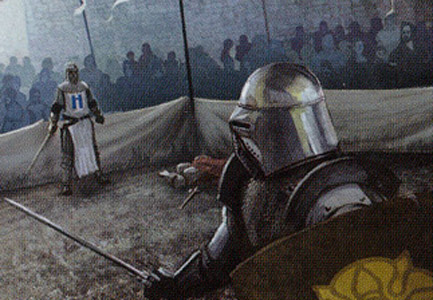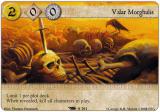Welcome to Card Game DB
Register now to gain access to all of our features. Once registered and logged in, you will be able to create topics, post replies to existing threads, give reputation to your fellow members, get your own private messenger, post status updates, manage your profile and so much more. If you already have an account, login here - otherwise create an account for free today!
Register now to gain access to all of our features. Once registered and logged in, you will be able to create topics, post replies to existing threads, give reputation to your fellow members, get your own private messenger, post status updates, manage your profile and so much more. If you already have an account, login here - otherwise create an account for free today!
The Grand Melee – Playing Control Part 2 – Reset, Reset, Reset...
May 24 2012 05:00 AM |
Kalindas
in Game of Thrones
Small Council The Grand Melee FireFox Hello readers and welcome back to this Grand Melee series on playing control. Today I will discuss one aspect of control that could be used in Melee to control the table. This was originally going to be a later article, but I’ve moved it forward since it came up in last week’s installment of comments. So today then, we will look at multiple resets as a means to slow down the game and limit your opponent’s board presence.
Hello readers and welcome back to this Grand Melee series on playing control. Today I will discuss one aspect of control that could be used in Melee to control the table. This was originally going to be a later article, but I’ve moved it forward since it came up in last week’s installment of comments. So today then, we will look at multiple resets as a means to slow down the game and limit your opponent’s board presence.Resets have always been a part of AGoT as far back as I can remember. The most common one is obviously Valar Morghulis (Core), but there are others as well, like Wildfire Assault (Core) and Westeros Bleeds (Core). The purpose of these reset cards is to clear or to reduce the amount of a certain card-type on the board. I say card-type because we should not forget there are locations resets as well, such as Fleeing to the Wall (Core) and Favorable Ground (QoD). Already we can notice a trend here- it seems resets come in two shapes, plots and events; more specifically, events that cost influence. This is good news, as plots are hard to cancel (only a well-timed Outwit (TIoR) or Old Bear Mormont can cancel Valar) and you can play them whenever you want. Furthermore, there is a fair amount of plot-cycling cards in the environment that will allow you to reveal more plots than your opponents. This means you will be able to play those resets again before turn 8. Let us now consider the events. While their influence cost can be difficult to set-up and imposes some constraint on your deckbuilding, it also means Paper Shield (QoD) will not stop them. This is important as Paper Shield is a popular event in Melee for its ability to stop Make an Example (PotS).
So how can we use these resets in an optimal fashion? Well considering the arguments above, House Martell springs to mind as a good candidate. It has the ability to accelerate plot-cycling with its maesters and Citadel Law (MotA). Revealing Valar this way makes it impossible to cancel. It can also recurse the reset events with The Prince's Plans (TIoR) and Open Market (ASoS). It is also a popular House in which to play the Knights of the Hollow Hill (MotM) agenda that will provide two of the needed influence for the events. Finally the agenda will also mean that the resets will hit it less as with no set-up and no gold producers it tends to have less board presence.
Another possibility for using resets is to bend the rules slightly to our advantage with saves and duplicates. This can easily be achieved in House Greyjoy. They have many cheap and efficient saves such as Maester Wendamyr (KotS) and The Iron Mines (KotS). Furthermore, Wendamyr needs influence to function optimally which the deck will need anyway for the resets.
There is a third candidate that I should mention, only thanks to one card- Bran Stark (Core). He can provide enough plot acceleration to make multiple resets an easier task for you. Furthermore, he is a Lord and can be protected easily. I must admit though that the other issues could be more difficult to resolve in this House, but hopefully someone will prove me wrong.
Can these decks change the face of the Melee Meta? While the threat of a reset every turn is definitely to be reckoned with, will it be enough to stop the very aggressive decks out there? I feel there are still some issues facing multiple reset decks. First, because aggro decks can win on turn two or three, you want to reset the board for the first time before turn two to make sure they don’t pull off an early win. That means you have to either reveal Valar as you second plot or have 4 influence in the dominance of turn one to pull off Westeros Bleeds. Of course you won’t always have to do it as early but remember we are speaking about the optimal solution here. Because you have to reset so early there could be some problems, maybe you don’t have the influence to do it, maybe you don’t have your saves available, maybe you didn’t draw any extra cards meaning restart after Valar could be difficult. All of this means that the early reset could turn into a forced moved resulting in no advantage to your board position if you can’t capitalize on it.
I also mentioned last week the psychological effects resets can have on your opponents. With a deck like this you are very likely to draw aggro from all of them. In theory, if all goes well and your reset strategy works this shouldn’t be a problem as they will be devoid of anything to attack you with. However we all know that theory and practice are different things and that you could still suffer from the revenge of three players.
I will leave your for today on that warning note. I will be back next week with a more subtle way of controlling the flow of the game.



 Sign In
Sign In Create Account
Create Account













8 Comments
Yup. I tend to play with the same people repeatedly, and they despise resets. I had a valar in a dragons deck I made (lots of saves), and they just repeatedly pummeled me to prevent me from gaining any advantage from it. They tend to be more forgiving of non-total resets like Wildfire Assault and Fleeing to the Wall, but playing Valar in my group is like painting a target on your forehead. I just avoid it.
Good article! Resets are always at the back of my mind (even though my group doesn't use them much). Although, I think more how to counter them then take advantage.
The trouble with a resets deck, is what else do you add to the deck that can A: survive or utilize the resets, and B: still get the power gain for a win.
Greyjoy, Tarle, iron mines, iron cliffs, maester wyndamyr plus all your normal characters, pretty easy win against decks not built for resets
Power of Blood is another huge benefit and i have seen some clever icon manipulation with coldhands